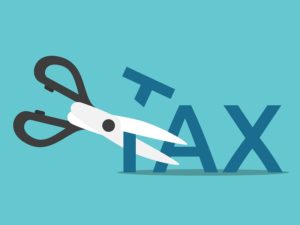Tax Record Retention Guide
Storing tax records: How long is long enough?
Tax Record Retention April 15 has come and gone and another year of tax forms and shoeboxes full of receipts is behind us. But what should be done with those documents after your check or refund request is in the mail?
Federal law requires you to maintain copies of your tax returns and supporting documents for three years. This is called the “three-year law” and leads many people to believe they’re safe provided they retain their documents for this period of time.
However, if the IRS believes you have significantly underreported your income (by 25 percent or more), or believes there may be indication of fraud, it may go back six years in an audit. To be safe, use the following guidelines.
Business Records To Keep… Personal Records To Keep…
1 Year 1 Year
3 Years 3 Years
6 Years 6 Years
Forever Forever
Special Circumstances
Business Document To Keep For One Year
Correspondence with Customers and Vendors
Duplicate Deposit Slips
Purchase Orders (other than Purchasing Department copy)
Receiving Sheets
Requisitions
Stenographer’s Notebooks
Stockroom Withdrawal Forms
Business Documents To Keep For Three Years
Bank Statements and Reconciliation’s
Employee Personnel Records (after termination)
Employment Applications
Expired Insurance Policies
General Correspondence
Internal Audit Reports
Internal Reports
Petty Cash Vouchers
Physical Inventory Tags
Savings Bond Registration Records of Employees
Time Cards For Hourly Employees
Business Documents To Keep For Six Years
Accident Reports, Claims
Accounts Payable Ledgers and Schedules
Accounts Receivable Ledgers and Schedules
Cancelled Checks
Cancelled Stock and Bond Certificates
Employment Tax Records
Expense Analysis and Expense Distribution Schedules
Expired Contracts, Leases
Expired Option Records
Inventories of Products, Materials, Supplies
Invoices to Customers
Notes Receivable Ledgers, Schedules
Payroll Records and Summaries, including payment to pensioners
Plant Cost Ledgers
Purchasing Department Copies of Purchase Orders
Sales Records
Subsidiary Ledgers
Time Books
Travel and Entertainment Records
Vouchers for Payments to Vendors, Employees, etc.
Voucher Register, Schedules
Business Records To Keep Forever
While federal guidelines do not require you to keep tax records “forever,” in many cases there will be other reasons you’ll want to retain these documents indefinitely.
Audit Reports from CPAs/Accountants
Cancelled Checks for Important Payments (especially tax payments)
Cash Books, Charts of Accounts
Contracts, Leases Currently in Effect
Corporate Documents (incorporation, charter, by-laws, etc.)
Documents substantiating fixed asset additions
Deeds
Depreciation Schedules
Financial Statements (Year End)
General and Private Ledgers, Year End Trial Balances
Insurance Records, Current Accident Reports, Claims, Policies
Investment Trade Confirmations
IRS Revenue Agents’ Reports
Journals
Legal Records, Correspondence and Other Important Matters
Minutes Books of Directors and Stockholders
Mortgages, Bills of Sale
Property Appraisals by Outside Appraisers
Property Records
Retirement and Pension Records
Tax Returns and Worksheets
Trademark and Patent Registrations
Personal Document To Keep For One Year
While it’s important to keep year-end mutual fund and IRA contribution statements forever, you don’t have to save monthly and quarterly statements once the year-end statement has arrived.
Personal Documents To Keep For Three Years
Credit Card Statements
Medical Bills (in case of insurance disputes)
Utility Records
Expired Insurance Policies
Personal Documents To Keep For Six Years
Supporting Documents For Tax Returns
Accident Reports and Claims
Medical Bills (if tax-related)
Property Records / Improvement Receipts
Sales Receipts
Wage Garnishments
Other Tax-Related Bills
Personal Records To Keep Forever
CPA Audit Reports
Legal Records
Important Correspondence
Income Tax Returns
Income Tax Payment Checks
Investment Trade Confirmations
Retirement and Pension Records
Special Circumstances
Car Records (keep until the car is sold)
Credit Card Receipts (keep until verified on your statement)
Insurance Policies (keep for the life of the policy)
Mortgages / Deeds / Leases (keep 6 years beyond the agreement)
Pay Stubs (keep until reconciled with your W-2)
Property Records / improvement receipts (keep until property sold)
Sales Receipts (keep for life of the warranty)
Stock and Bond Records (keep for 6 years beyond selling)
Warranties and Instructions (keep for the life of the product)
Other Bills (keep until payment is verified on the next bill)
Depreciation Schedules and Other Capital Asset Records (keep for 3 years after the tax life of the asset)
To receive our free newsletter, contact us here.
Subscribe our YouTube Channel for more updates.

Alan Olsen, is the Host of the American Dreams Show and the Managing Partner of GROCO.com. GROCO is a premier family office and tax advisory firm located in the San Francisco Bay area serving clients all over the world.
Alan L. Olsen, CPA, Wikipedia Bio

GROCO.com is a proud sponsor of The American Dreams Show.

The American Dreams show was the brainchild of Alan Olsen, CPA, MBA. It was originally created to fill a specific need; often inexperienced entrepreneurs lacked basic information about raising capital and how to successfully start a business.
Alan sincerely wanted to respond to the many requests from aspiring entrepreneurs asking for the information and introductions they needed. But he had to find a way to help in which his venture capital clients and friends would not mind.
The American Dreams show became the solution, first as a radio show and now with YouTube videos as well. Always respectful of interview guest’s time, he’s able to give access to individuals information and inspiration previously inaccessible to the first-time entrepreneurs who need it most.
They can listen to venture capitalists and successful business people explain first-hand, how they got to where they are, how to start a company, how to overcome challenges, how they see the future evolving, opportunities, work-life balance and so much more..
American Dreams discusses many topics from some of the world’s most successful individuals about their secrets to life’s success. Topics from guest have included:
Creating purpose in life / Building a foundation for their life / Solving problems / Finding fulfillment through philanthropy and service / Becoming self-reliant / Enhancing effective leadership / Balancing family and work…

MyPaths.com (Also sponsored by GROCO) provides free access to content and world-class entrepreneurs, influencers and thought leaders’ personal success stories. To help you find your path in life to true, sustainable success & happiness. It’s mission statement:
In an increasingly complex and difficult world, we hope to help you find your personal path in life and build a strong foundation by learning how others found success and happiness. True and sustainable success and happiness are different for each one of us but possible, often despite significant challenges.
Our mission at MyPaths.com is to provide resources and firsthand accounts of how others found their paths in life, so you can do the same.
Which Tax Deductions Are Available This Tax Season?
Which Tax Deductions Are Available This Tax Season? Tax time has officially started. That means, if you haven’t already, it’s time to gather up all your important tax documents and information. It might also be a good time to hire an experienced accountant. The Tax Cut and Jobs Act will play a huge role in…
Tax Season Means Scam Season: What to Watch for
Tax Season Means Scam Season: What to Watch for Tax season means a lot of things. It means organized taxpayers are already preparing their returns and getting ready for their refunds. It means disorganized taxpayers are scrambling to find everything they need just to start their returns. It means accountants are busy helping both organized…
How the Falling Market Could Help You Save in Retirement
How the Falling Market Could Help You Save in Retirement The falling stock market has been a real downer for most investors to watch. The massive drops, as well as the volatile nature of the market in recent weeks and months, have left many investors trembling. But as with most bad news, there might be…
Your Chances of Being Audited Continue to Decline
What’s the scariest possible outcome of filing your taxes? Almost anyone would answer that question with “being audited.” Being audited by the IRS is never fun. Fortunately, it’s something that most people will never have to experience. The fact is the IRS actually audits very few returns all things considered. Furthermore, the IRS also…




